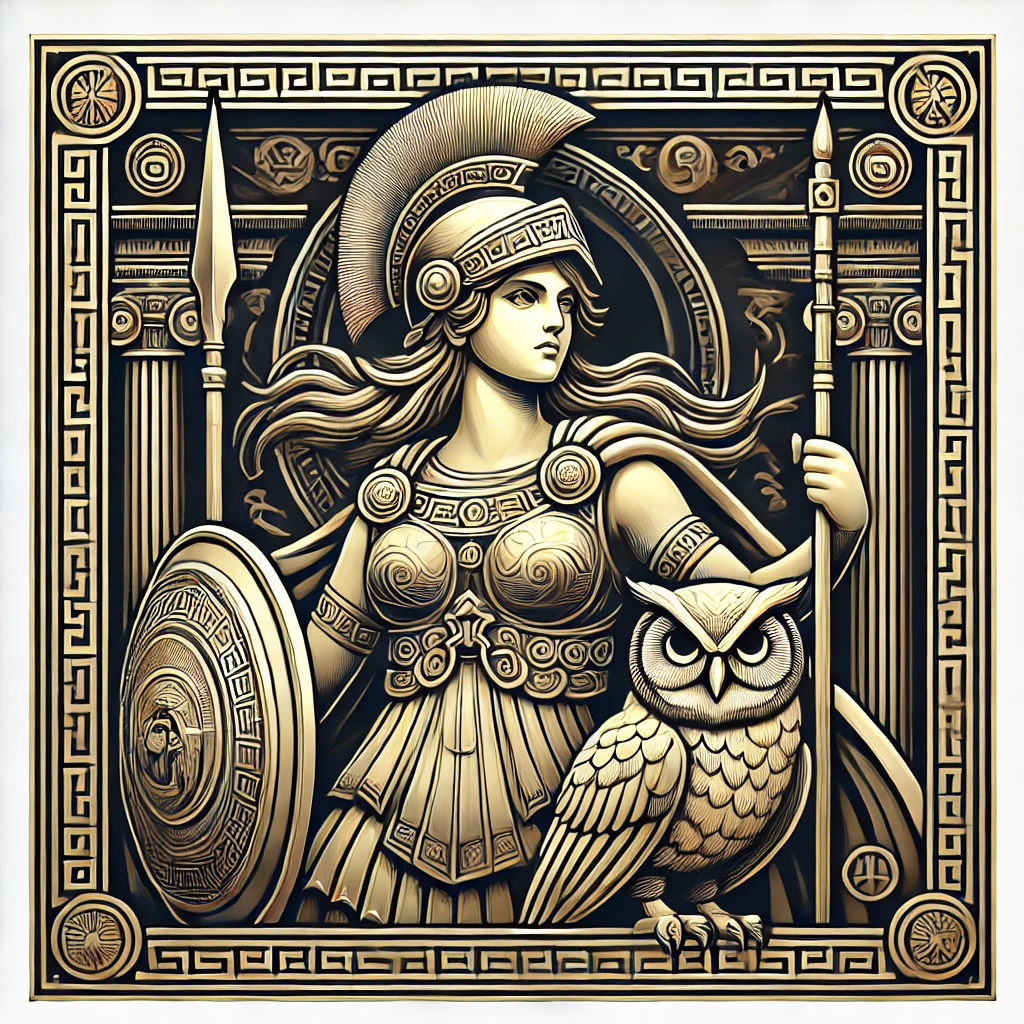The myth of Medusa, one of the most iconic figures in Greek mythology, is known for its tragic story of the transformation of a beautiful woman into a monstrous creature with snakes for hair. In the most common version of the myth, Medusa is punished by the goddess Athena after being raped by Poseidon, transforming into a being whose gaze petrifies anyone who faces her. However, this interpretation of the myth raises an important question: why would Athena, the goddess of wisdom and justice, punish a victim?
Recently, a new reading of the myth suggests that, instead of a punishment, Medusa's transformation was a act of protection by Athena. In this version, Athena grants her the power to defend herself against any aggressor, transforming her into an untouchable figure. From this point of view, Medusa becomes not only a symbol of pain and suffering, but also of autonomy, protection e resistance.
Index

Athena: Goddess of Wisdom and Justice
Athena is one of the most revered deities in the Greek pantheon, known as the goddess of wisdom, strategy and just war. Unlike other gods, who often acted impulsively, Athena was a rational deity, always seeking solutions that balanced justice and protection. Her image was often associated with defending the oppressed and those who needed her guidance.
A clear example of its protective nature can be found in the myth of the foundation of Athensin which Athena competed with Poseidon to give the Athenians the most valuable gift. While Poseidon offered a horse, a symbol of war and conquest, Athena gave the citizens the olive treeAthena is a symbol of peace, prosperity and longevity. The citizens' choice of Athena as the city's patron reflects her role as a goddess who values life, wisdom and protecting her own.
In addition to the myths, Athena also had a significant impact on real history. Alexander the GreatFor example, he revered Athena and often performed rites in her honor. During his campaigns, he sought the goddess' protection and blessing, believing that she guided his military strategies. When Alexander arrived in TroiaAs a result, he made sacrifices at the temple of Athena, seeking her blessing before continuing his journey of conquest. For him, Athena symbolized the union between military strategy and wisdom, reaffirming his belief in the goddess as a protective force.
Another myth that reinforces this character is the help Athena gave to Odysseus in Odyssey. Throughout Odysseus' journey to return to Ithaca, Athena acts as his mentor, protecting him from danger and guiding him wisely. Not only does she offer him strategies to defeat his enemies, but she also helps him to remain calm and reasonable in times of great difficulty. This protection reflects the fact that Athena did not only act by force, but also by intelligence and justice.
Given this protective nature, it's hard to imagine Athena as someone who would punish a victim of violence. In the most popular myth, Medusa's transformation is seen as a punishment for having been raped by Poseidon in the goddess' temple. However, this interpretation seems at odds with Athena's true essence.
A new reading of this myth suggests a more coherent vision: instead of punish MedusaAthena would have protected her, ensuring that she would never again be vulnerable to a man or any other aggressor. Medusa's transformation, therefore, would have been a act of defenseIt gives her the power to protect herself and makes her invulnerable to danger.
Medusa: From Victim to Guardian
The most widespread version of the Medusa myth tells of her rape by Poseidon in Athena's temple and her subsequent transformation into a monster, as if it were a punishment imposed by the goddess. However, this reading seems to contradict Athena's nature as a goddess of wisdom and justice. Why would such a wise and just deity punish a victim?
A new perspective suggests that Athena, instead of punishing Medusa, offered her a form of protection. By being transformed into a Gorgon with the ability to turn men to stone with a single glance, she went from victim to an entity with absolute power over those who might try to hurt her again. Athena would have granted her the power to protect herself, ensuring that no man could approach her without facing fatal consequences.
In this sense, history could be seen as a act of liberation. Medusa became invulnerable to future abuse, a powerful guardian whose powers allowed her to protect her dignity. The transformation, then, was a empowerment gestureThis was Athena's way of ensuring that the trauma she suffered would never happen again.
This new interpretation of the myth is better aligned with the character of Athena, who, throughout the mythology Medusa, a Greek woman, has always acted in defense of the weakest, being a protector of the oppressed. Rather than being a curse, Medusa's transformation can be seen as a gift, allowing her to be feared and respected, rather than seen as a helpless victim.

The Role of Athena in the Myth of Perseus: Medusa and Revenge
One question that arises from this new reading of the myth is: why Athena helped Perseus kill Medusaif she had granted her the power of protection? To understand this question, it is important to consider the possibility that Medusa, over time, was consumed by loneliness and trauma.
Medusa was a victim of Poseidon's violence, and even though she was transformed into a Gorgon as a form of protection, she still carried the emotional weight of her experience. Her transformation, although it protected her physically, may not have healed the deep psychological wounds she had suffered. Living in isolation, unable to interact with the world without being seen as a threat, Medusa may have been driven mad by loneliness and the pain she never overcame.
Over time, Medusa went from being just a victim to a figure of vengeance. Her power to turn anyone into stone - originally a gift to protect her - began to be used as a weapon of retaliation against those who approached her. In this sense, Medusa went from being a defender of herself to a vengeful force, unable to break out of the cycle of pain and isolation.
AthenaAs the goddess of wisdom and justice, she may have realized that Medusa's cycle of suffering and revenge was out of control. Although she had granted Medusa the power of protection, the situation had changed. Medusa was no longer the innocent victim, but someone consumed by her emotions and her isolation. In this context, Athena would have seen Medusa's death not only as a solution to the problem she represented for others, but also as a release for Medusawho had lost himself in his own pain.
The help Athena offered Perseus may therefore have been a way of restoring balance. Medusa was no longer the same as when Athena transformed her, and her elimination was necessary not only to protect the world, but perhaps to put an end to Medusa's endless suffering. The fact that Athena keeps Medusa's head on her shield (the Aegis) after the Gorgon's death can also be seen as a tribute to her power and a reminder that Medusa, even in her death, continued to protect Athena.
Conclusion
Medusa's story, seen from this new perspective, reveals the complexity of a figure who went from victim to avenger, trapped in a cycle of pain caused by violence and abandonment. Although Athena gave her the power of protection, the trauma she never overcame, combined with Poseidon's impunity, meant that Medusa became a threat not only to others, but to herself.
Athena's help to Perseus to defeat Medusa can be seen not as an act of cruelty, but as an attempt to restore balance and, perhaps, give Medusa a form of final liberation. The fact that Poseidon, who was responsible for her suffering, was never punished only adds more layers to the Gorgon's tragedy, leaving a feeling of deep injustice.
In the end, Medusa's death doesn't resolve the wounds caused by impunity, but it does end the cycle of pain she was experiencing, a pain fueled by the lack of justice and her own transformation into a feared creature. The myth of Medusa is ultimately a reminder of how unresolved suffering and the absence of justice can turn victims into figures of vengeance, without those truly responsible paying for their crimes.
I'm passionate about magic and spirituality, always looking for new knowledge about rituals, energies and the mystical universe. Here, I share magical practices and spiritual tips for those who want to connect more deeply with themselves and the world around them, all in a light and accessible way.








